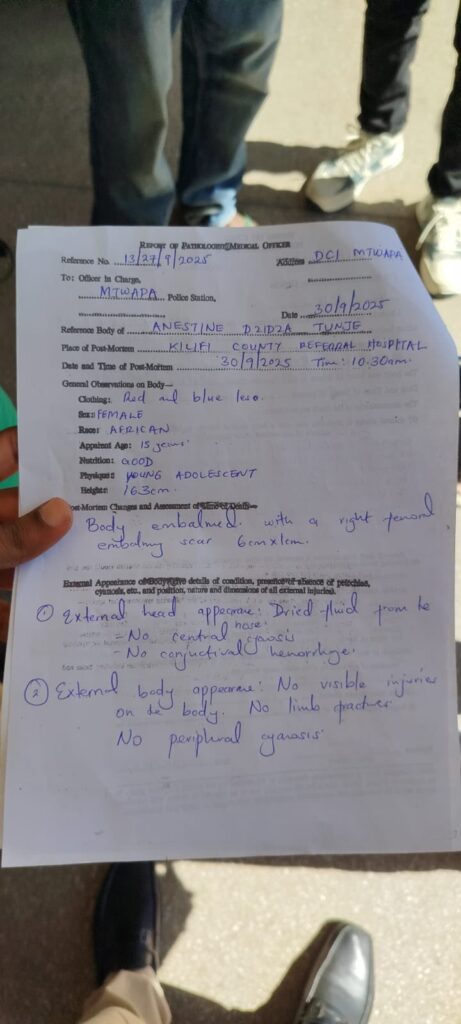The death of 15-year-old Annet from Gongoni Primary School in Kilifi County has left the nation in shock and anger. Her life was cut short after she allegedly suffered fatal injuries from her teacher, an act that her family and many Kenyans see as a brutal failure of both the education and justice systems.
According to her family, the teacher struck Annet on the head as punishment. What followed was a tragic decline in her health. She began complaining of severe pain, and her condition worsened until a postmortem confirmed that she had suffered internal bleeding caused by blunt force trauma to the head.
What makes this incident even more painful for the family is the alleged negligence that followed. They say they rushed to report the matter at Kijipwa Police Station, but the officers did not take the case seriously.
No immediate action was taken against the teacher. Neither an arrest nor an interrogation happened, which has led the family to accuse both the police and the school of shielding the suspect.
For them, justice has been delayed at the very moment when it is most needed, and their cries have now spread beyond Kilifi, fueling a nationwide call for accountability.
Attention has now shifted to the Teachers Service Commission, which is facing public scrutiny over how such an act could happen in a school despite the ban on corporal punishment.

The law in Kenya is clear: corporal punishment is outlawed under the Basic Education Act, and teachers are expected to use non-violent ways of discipline. Yet, Annet’s death has shown that these laws are not being followed or enforced as they should.
Parents and child protection advocates are asking hard questions about how many other cases might be going unreported and how safe children really are in the hands of those meant to guide them.
Child rights organizations have stepped in, calling for the arrest and prosecution of the teacher without any further delay.
They warn that if no firm action is taken, it will encourage a culture of silence and impunity, putting countless other children at risk. They argue that this case is not just about one family’s loss but about protecting the rights and safety of all children across the country.
Pressure is mounting on the Ministry of Education, TSC, and security agencies to demonstrate seriousness in handling the case. Many Kenyans see this as a turning point in how the nation treats violence against children in schools.
For Annet’s grieving family, nothing can bring their daughter back, but they have made it clear that their fight is for justice. They insist her death must not be ignored or treated lightly. Their demand is simple but powerful, their daughter’s life must not be lost in vain, and justice must be served without delay.





















Add Comment